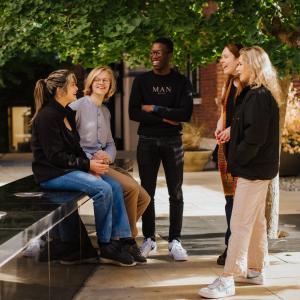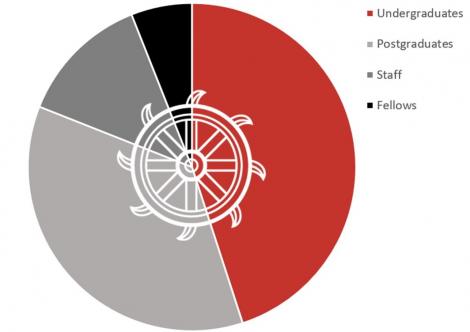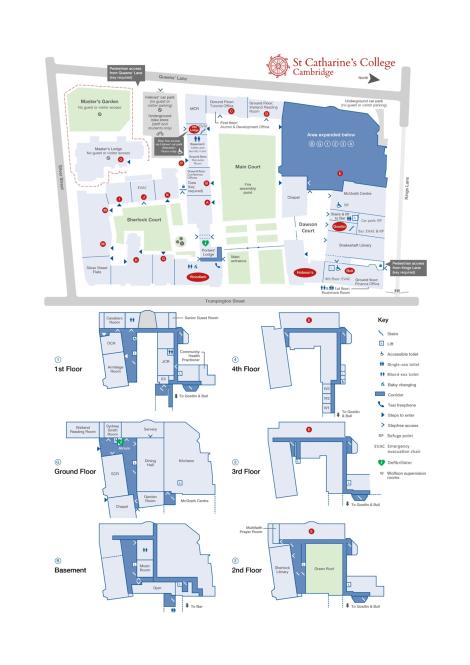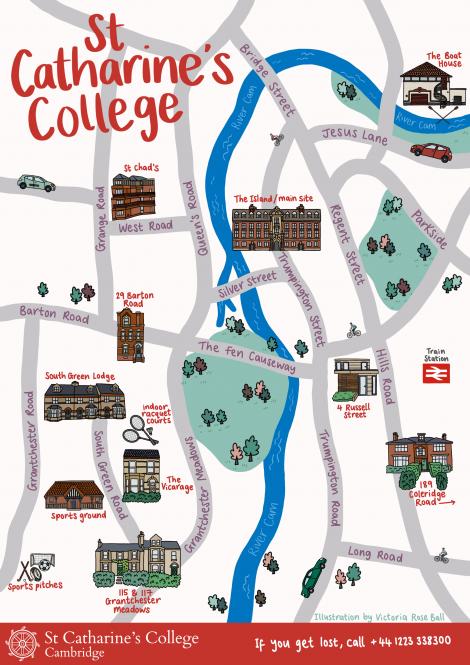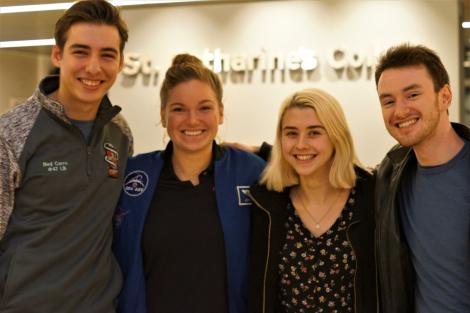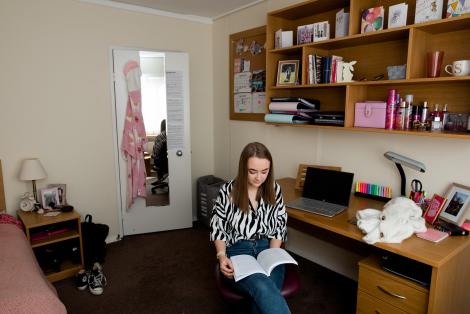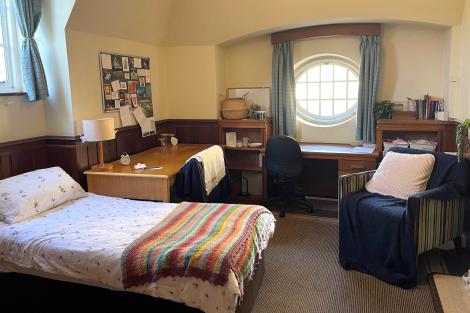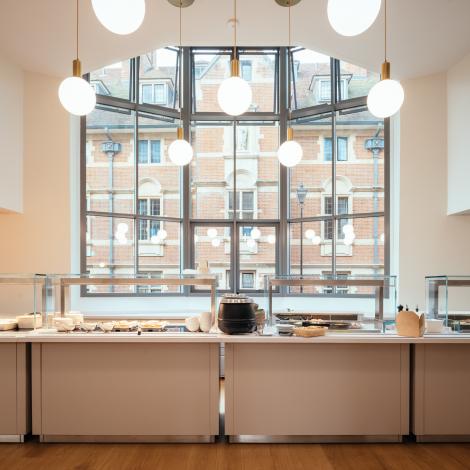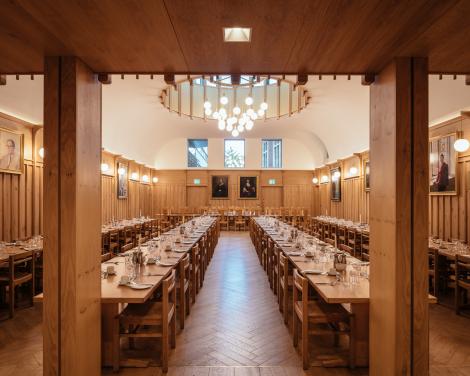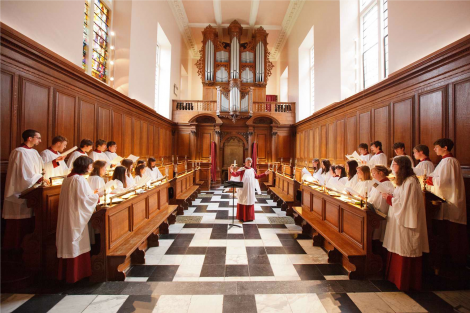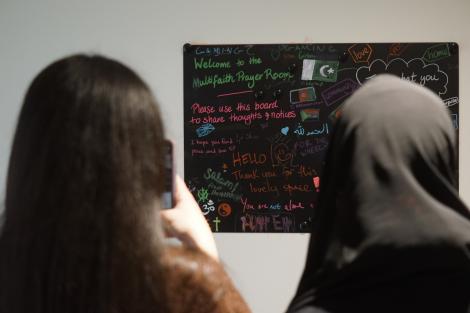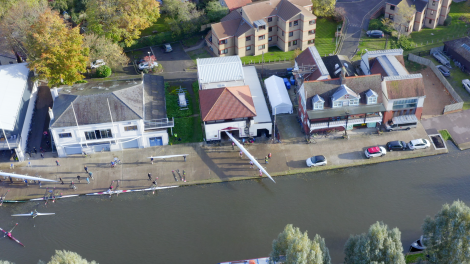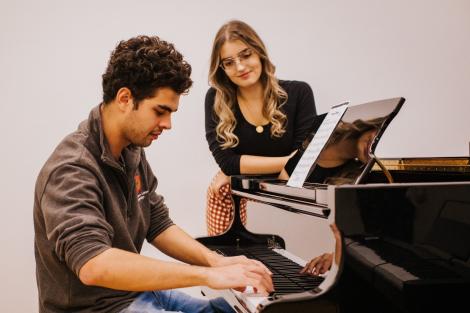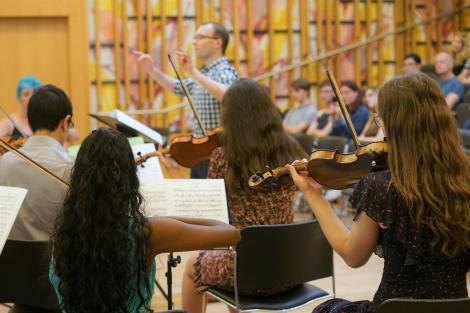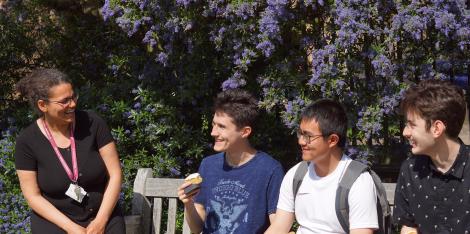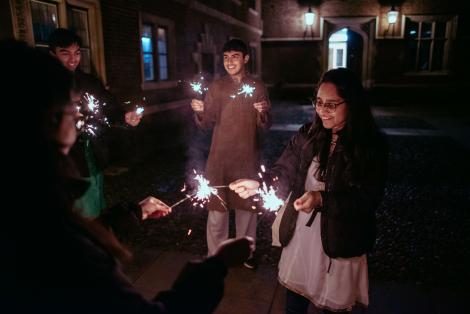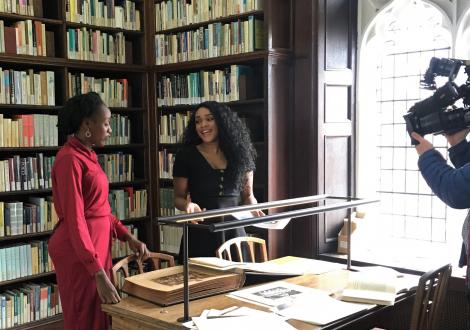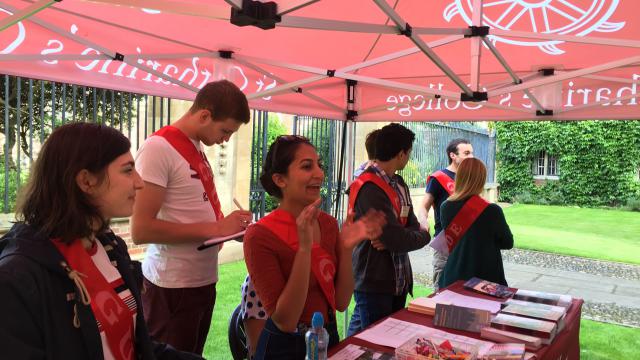
Undergraduate prospectus
Welcome! Our aim at St Catharine's College (fondly known as Catz) is to be a friendly, supportive community which helps you make the most of all the University of Cambridge has to offer.
Most people who apply to study as an undergraduate at the University of Cambridge apply to a particular college. Colleges are very important to our students – they are where you would live, eat, have small-group teaching sessions and make many of your friends.
This online prospectus has been created with our current undergraduates to help applicants make confident decisions about where to apply. We also decided to create an online resource (instead of a traditional/printed prospectus) to save paper and water consumption, and reduce CO2 emissions.
Please use the tabbed sections below to find out more about aspects of life at Catz that are important to you. We have a separate dedicated section of this website about the application process, and you can contact undergraduate.admissions@caths.cam.ac.uk if you still have any questions after reading our website.
Founded in 1473, Catz is a close-knit and friendly community of students, academics (known as Fellows) and staff situated in the very heart of Cambridge. Read about our history.
We are committed to attracting students with the highest academic potential, regardless of their gender or their financial, social, religious or ethnic background, and supporting them fully throughout their years at one of the best universities in the world.
Our community in numbers
Of the roughly 1,000 people who live, work and study at Catz, the biggest group is our undergraduate students (45%).
Catz is a co-educational institution, which is reflected in our undergraduate students:
- Female = 235 students
- Male = 220 students
- Other = 12 students
The College attracts talented students from a wide range of countries, creating a vibrant, international undergraduate community:
- UK/Home = 373 students
- International = 94 students
Junior Combination Room
On admission to the College, undergraduate students become members of the Junior Combination Room (JCR). The JCR gets its name from an actual room at Catz where undergraduates can meet and relax together, as well as using it as an extra study space on top of the College's libraries.
Every year, our undergraduates elect representatives to the JCR Committee, which is responsible for organising an active calendar of events and providing an important link between our students and decision-making bodies at Catz. Visit the JCR's website.
Getting around Catz
There are maps of the facilities on the College's Island/main site (enlarged version available) and the College's sites across the city of Cambridge (enlarged version available).
Find further information about our location and visiting us.
Catz is dedicated to academic excellence and helping students achieve their full potential. Academic standards are high here and you will be taught by world-renowned experts and researchers working at the cutting-edge of their subject. When students come to Catz, we expect them to work hard to fully benefit from the Cambridge experience.
To support students, the College invests actively in world-class teachers, academic mentors, pastoral support and academic facilities which we believe are the best in the world. If you come to Catz, you will find out why the College and the University are so highly respected.
Undergraduate subjects
The College welcomes applications to study a wide range of degree subjects at undergraduate level. Find out about the different subjects we offer.
Please note that we do not admit undergraduates to read Architecture, Design, Education, History of Art or Linguistics. We welcome applications for every other subject taught at the University of Cambridge. In addition, please note that we do not admit applicants in Law, Medicine or Veterinary Medicine who already hold a degree.
Teaching and learning
What makes studying at Cambridge so special is that students are offered small-group teaching sessions (known as supervisions) alongside lectures and other classes that you might encounter at other universities. Supervisions provide the opportunity to explore a subject more deeply, discuss your own work and ideas, and receive regular feedback. As they aren’t assessed, supervisions provide the ideal environment for you to test your ideas and interests, while encouraging you to develop your thinking. Find out more how undergraduate degrees are taught at Cambridge.
Expanding your horizons
The academic opportunities available here are endless, whether it is joining a student society to meet others in your subject and hearing from invited speakers from around the world, taking a (Catz-subsidised) course at the Language Centre, or participating in one of the exchange opportunities offered by Catz – in 2023, for example, our students participated in international academic exchange programmes at Caltech, Heidelberg and Kyoto.
There is also a great deal of support available when our students start to think about life after Catz – all are eligible for life-long support from the University's excellent careers service, and the College's network of former students (known as alumni) spans a variety of sectors and professions if you are looking for advice.
It's also important for students to have a life outside of their studies and we encourage everyone to develop a healthy ‘work-life’ balance and take advantage of the enormous range of extracurricular activities and health and wellbeing support on offer.
Catz offers College accommodation for all years of undergraduate courses lasting three or four years. The College has invested over £30 million in improving our student accommodation and facilities over the last few years, including enhancing the accessibility and sustainability of our historical buildings.
As a result, we have modern rooms and ancient rooms, small (cheaper) and large (less cheap) rooms, ensuite and non-ensuite, but no 'typical' room. The College's buildings have been constructed and modified over the centuries so that few rooms are the same. However, Catz accommodation is accredited by ANUK (Accreditation Network UK) and all rooms are of a good standard.
Conall, an undergraduate student elected as the JCR's Accommodation Officer 2023–24, explains:
"Catz offers a range of room options, including single rooms, en-suite rooms, and shared flats (in second/third year), designed to suit different budgets and preferences, all furnished with the essentials. Living together on the main site as first years is great; you’re always bumping into each other, which is one of the many reasons Catz is so friendly! Being centrally located is great because everything is nearby!"
| First year students live on the main site (known as the Island site) located in the heart of Cambridge city centre. Students are notified in September about their room allocation, based on their cost/band preference, subject to availability. |
| Second year students live in the flats at the St Chad's site on Grange Road, a short cycle or walk from Catz. It is popular because each flat groups together four or five rooms with shared kitchen and bathroom facilities. The St Chad's site has its own communal spaces (indoors and outdoors) for socialising and relaxing with others. |
| Third year students typically return to the main site. (Final-year students on the Modern & Medieval Languages course returning from a year abroad are counted as 'third years' for accommodation purposes.) |
| Fourth year students are allocated room by the Catz accommodation office, usually located in off-site houses, such as at South Green Lodge or the two houses at St Chad's. |
Rooms on the main site have access to a small shared kitchen (known as a gyp room) with fridge, sink and microwave. Off-site accommodation such as St Chad's contains fully-equipped kitchens with ovens.
Accommodation costs
The cost of College accommodation depends on room size, location and facilities – most are centrally heated but a few have electric heaters. Rooms in the second and third years are allocated by ballot, and any student worried about their finances can request a smaller, cheaper room.
In the academic year 2024–25, Catz accommodation costs between £1,426 and £2,179 per term depending on your room type and length of contract. These costs are reviewed annually and small increases are expected in future years. To get an idea of accommodation and other costs, see our advice about student finances.
What's included in Catz accommodation?
✓ Essential furniture (bed, desk, desk chair, wardrobe, drawers, shelves)
✓ Essential electrical equipment (lamps in bedrooms; equipment in shared kitchens; plus shared laundry facilities)
✓ Heating, lighting and water bills are all included in your rent, as is high speed broadband internet access. This is available as high speed wi-fi.
✓ Security: The Catz Porters' Lodge is contactable 24/7 if students have any security concerns. Our undergraduate accommodation also benefits from CCTV in public areas.
✓ Cleaning: The Catz housekeeping team aims to clean student bedrooms at least once every 1–2 weeks and and cleans all communal areas more regularly, including corridors, kitchens and shared bathrooms. They also remove rubbish and recycling from shared areas.
✓ Gardens: Our undergraduate accommodation is situated next to gardens, which are maintained by the Catz gardeners for students to enjoy.
✓ Safety: Fire blankets and extinguishers are provided. Fire alarms are in operation and tested every week (typically Wednesday mornings between 9am and 12pm).
Catering
Breakfast, lunch and an evening meal are available in the self-service cafeteria in the College Hall or bar. Guests may also be invited to these meals for a small surcharge. Formal hall (gown needed!) is also available several nights each week.
The cafeteria in the Hall provides a wide range of dishes for lunch and dinner every day, which students can eat in Hall or take away. In addition to the hot main dishes, there is a fresh salad bar, homemade soup and bread, fruit, coffee, soft drinks and sweet treats available. Each week during term-time, undergraduates can sign up for a formal evening meal (known as 'formal hall'), which brings together students and their guests for a memorable social occasion.
The Coffee Bar/Bar is a space to study, unwind or party. During the day, the College Bar becomes Catz Coffee Bar, run by College staff and serving coffee all day so you can meet with friends, socialise and relax to get the perfect study/life balance. In the evening, our students take control and special social events may take place here, including include parties (known as ‘bops’), comedy nights, quiz nights and karaoke nights. Alcoholic drinks are only served in the evening, but soft drinks and coffee/tea are popular throughout the day and evening.
Libraries and study spaces
Every College in Cambridge has its own library, but at Catz we have two:
- The Sherlock Library, which dates from the 1750s, contains the College's collection of books on modern languages (including linguistics), English literature, art and architecture, and cinema and theatre studies.
- The Shakeshaft Library contains the rest of our modern books, our DVD and music collections, computers, printing and binding facilities.
Nearly everything on the shelves – about 45,000 books – can be borrowed by current members of College. Both libraries are open at all times, although individual students tend to drop in as suits their own study schedule. Find out more about our libraries.
The College also has well-equipped computer rooms, as well as fast internet access in every student room.
The College Chapel
The 18th-century Chapel is a calm and beautiful space in the heart of the College, open every day from early until late. Anyone, of any faith or none, can spend time in the Chapel. Every day at lunchtime music is broadcast in the Chapel as an aid to reflection. The worshipping life of the Chapel includes both formal choral services and more informal opportunities for worship. Find out more about Chapel services, visiting preachers and events.
The Prayer Room
The Multifaith Prayer Room is also located in the heart of the College. It is open to any and all members of the Catz community and can be used for personal prayer in any religious tradition, or for meditation, reflection, or just peace and quiet. Find out more about the room’s facilities and how to access them.
Sports facilities
Catz is proud to maintain a range of sports facilities to benefit our community – some of the best of any Cambridge College. These exist primarily so that our students can realise as much as possible of their personal potential while studying at the College. All facilities are available for no additional charge. Find out more about our different indoor and outdoor sports facilities.
Music facilities
There are two rehearsal spaces in College, both of them on the main site. Find out more about how to access and book these rehearsal spaces.
At Catz, we believe it is extremely important that no one is deterred from coming to study with us because they worry they cannot afford it. This page is to give you an idea of how much it will cost to be a student here, and the many ways that Catz and the University of Cambridge can help – please read it carefully.
There is a perception that it will be expensive to study at university and even more expensive to be at Cambridge. In fact, while the university fee charge will be identical for most universities, living expenses and accommodation charges are generally lower here in Cambridge than elsewhere.
Ben, an undergraduate student elected as the JCR's Access and Admissions Officer 2023–24, explains:
"Catz and the wider Cambridge University recognises that limits on students working during term time requires a extra level of support financially. This is targeted not just at day-to-day living costs (for example the Cambridge Bursary Scheme) but also enriching students' lives through travel or sports bursaries as well as a range of other financial grants."
Step 1: What will your fee status be?
Colleges collect fees on behalf of the University, and in the first instance it is the colleges which determine applicants' fee status. If you have any queries about your possible fee status, please first visit the website for the UK Council for International Student Affairs and select the 'Higher Education' link for their guidance. Then if you have any further queries, please contact the College Admissions Office (undergraduate.admissions@caths.cam.ac.uk).
In general if your are a UK national with an unfettered right to live in the UK and will have been resident in the UK for the three years immediately preceding the start of your course, then you will probably be assigned 'home' fee status.
For 'home' students, your previous highest qualification at the time when you start a Cambridge course is also important. In general, if you already have a first degree or equivalent qualification, you normally are not eligible for government-sponsored funding and will be subject to a different fee system (unless you are studying the later years of the courses in Architecture [to which St Catharine's does not admit students], Medicine or Veterinary Medicine).
Most other students are likely to be assigned 'overseas' fee status, but please note that the situation can be more complex for some applicants – including Irish nationals, those with 'settled' or 'pre-settled status', and a variety of other exceptions. Again, refer to the the UK Council for International Student Affairs for advice.
Step 2: How much will studying at St Catharine's cost?
a. Tuition fees
At the time of writing, most Home students take out a government loan to pay for their tuition fees. Overseas students pay their own tuition fees, which vary according to the subject they are reading, as well as a college fee to cover teaching and various facilities provided by their college. Find out more about tuition fees.
b. Living costs
For the academic year 2023–24, Catz accommodation costs between £1,367 and £2,073 per term (dependent on size, location and shared/en-suite facilities). Find out more from the 'accommodation' section of this prospectus.
The compact geography of the Colleges and University Departments in Cambridge means there is no need to incur any transport expenses (except, for many students, the maintenance of a bicycle!).
In addition, it will be necessary to cover costs of clothes, books, travel, entertainment, etc. Catz works hard to ensure that our libraries are well-stocked with the books needed by students – and this can help our students save money. You should probably delay most book purchases until you have seen what we have, and ask for advice about which books are useful from your Director of Studies, supervisors and the second-years taking your course.
For an estimate of what it costs to be a student at Cambridge, see the University's online advice about student finance. Please note that, in accordance with University regulations, the College will not allow students to seek paid employment during term – if you are having trouble making ends meet, you should contact your Tutor about what support is available. You may also want to gather independent, external advice about the costs of being a student, such as from Money Saving Expert.
Step 3: How Catz can help
The College offers a wide range of financial assistance to its students, in addition to the support available from the University and the Government. We offer this support partly from the College's own funds, but also from the generous donations of our benefactors, many of whom have provided us with funds specifically intended for this purpose. Below is a summary of financial assistance we offer to students who need it.
- College bursaries: Catz has specific funds to support students in need of short- or long-term financial assistance through the use of hardship loans or grants.
- Course costs: There are also funds available to help students with specific costs of their courses, including awards to support clinical medical and veterinary students with their elective placements.
- Travel grants: Catz annually awards a large number of travel grants to its students, and those whose travel is related to their course usually receive more help
- Language courses: The University offers excellent language courses through its Language Programme; costs are subsidised for students, but can be covered further by awards from the College.
- Sports or music costs: The purchase of equipment or training and tuition costs can be partially or completely covered by sports bursaries from the College.
- Internships: Students in receipt of Cambridge Bursaries carrying out internships and placements during the vacations can apply for grants to support this work. Those not in receipt of such bursaries can often apply to the travel grant fund for this purpose.
- Prizes and scholarships: These are awarded annually for academic excellence and achievement in other aspects of College life.
Step 4: Other important sources of help
Most UK students, and many overseas students, also have access to a variety of other sources of funding in addition to those listed above. For more details see the University website – note especially the Cambridge Bursary (free financial support of up to £3,500 a year, which 25-30% of undergraduate students are eligible for) and the Tuition Fee Loan.
If you are holding an offer for a course which could involve either 3 or 4 years in Cambridge – for example, many strands of Natural Sciences have popular fourth year options – then you should apply for 4 years' funding at the start. It is easier to switch funding from 4 to 3, than to apply for a year's extension from 3 to 4.
Also, each year a number of international students are awarded a bursary from the Cambridge Trust. International candidates holding offers (conditional or firm) will be sent information about how to apply, early in the calendar year in which they are due to start their course at Cambridge.
Other funding has been made available by donors to help specific groups of students once they arrive at the University of Cambridge. Eligibility criteria and application deadlines vary according to the funding scheme, so it is worth checking if any are relevant for you around the time you apply study here. Recent examples include:
- The Rowan Williams Studentship supports students from areas of instability or zone of conflict. Unusually, this studentship can provide full fees and costs, including administrative costs such as travel, visa costs and the immigration health surcharge.
- The Stormzy Scholarship supports Black/mixed Black UK undergraduates by covering the full cost of tuition fees and providing a maintenance grant, which will significantly reduce the need for recipients to take out government loans.
- The Finlay Family Bursary supports Scottish undergraduates by covering the full cost of tuition fees and providing a living allowance.
As always, if you would like to ask specific questions but cannot find the information you need, get in touch with us at undergraduate.admissions@caths.cam.ac.uk.
Catz is deeply committed to offering meaningful and effective health and wellbeing support to all members of our community through one-to-one support and a programme of activities. Through care and investment over recent years, the College has established its position at the forefront of welfare provision in Cambridge.
The core Health & Wellbeing team (the Head of Wellbeing, the Community Health Practitioner and the Chaplain; pictured together) coordinates this support, drawing on resources and initiatives from across the College and beyond. You can find out more about what the team does and access helpful resources from their section of our website.
Robert and Millie, undergraduates elected as the JCR's Welfare Officers 2023–24, explain:
"The Catz Health and Wellbeing Team offer lots of direct and indirect support – from fun and informal events, to personalised support and guidance. Catz students are consistently helped to prioritise our physical and mental wellbeing, despite our schedules often being packed due to the array of amazing opportunities available at Cambridge."
Tutors
All students are assigned a Tutor on joining the College. Our tutors help to support the general well-being of their students (or ‘tutees’), and you should not hesitate to call on your tutor for advice or assistance on navigating academic, financial, social and personal matters while you are at Cambridge.
Tutor for Disabilities
This particular tutor supports students with disabilities during their time at Cambridge, in their interactions with either the College (e.g. accommodation requirements) or the wider University (often alongside the Accessibility and Disability Resource Centre).
Ben, an undergraduate student elected as Disability Officer 2023–24, added:
“Disabled students at Catz have access to a wide range of support, including our excellent trio of welfare staff in the form of our College Nurse, the Head of Wellbeing and the College Chaplain, who are all excellently placed to advise on matters related to disability, as well as liaise with the University's Accessibility and Disability Resource Centre."
Neurodiversity advisor
For a two-year pilot, a neurodiversity advisor will be based at Catz and work alongside our Tutors, Directors of Studies and Health & Wellbeing Team to support our community.
"We want St Catharine’s to be a diverse and vibrant community wholly committed to fostering an environment where everyone is able to thrive and feel a sense of belonging. We are committed to being an inclusive community with a culture that upholds excellence, diversity and equality of opportunity for all" – Catz Equality, Diversity and Inclusion (EDI) Strategy 2023
Catz has made great strides in our recent history towards nurturing equality, diversity and inclusion. The College had already modelled best practice in various aspects of College life yet had not clearly articulated our aims and ambitions until 2023 when our first EDI strategy was published, which explains the current approach to fostering equality, diversity and inclusion.
Recent milestones
2014: Catz first flew the Rainbow Flag to celebrate the return of alumnus Sir Ian McKellen. Over the next seven years, the College flew the Rainbow Flag to mark different national and international days of significance. Since 2021, the Progress Flag has been flown on these occasions to include traditionally marginalised LGBTQ+ communities.
2020: The EDI Working Group was set up, bringing together Catz students, staff and Fellows to guide and inform policies, procedures and behaviours across all aspects of College life. The Working Group was responsible for developing the EDI strategy in 2023 and will lead on the development of action plans to deliver against the College's EDI objectives.
2020 onwards: Catz has started every new academic year by celebrating Black History Month (which is held in October in the UK) and embracing over a century of Black students, staff and Fellows contributing to our academic community. Find out more about our Black history.
2021: An LGBTQ+ Fellow was elected and the LGBTQ+ Care Group was set up to help nurture an environment that is supportive on issues of importance for people who identify as LGBTQ+, by providing a dedicated forum for discussing issues that affect LGBTQ+ members of the Catz community. The Group reports to the EDI Working Group with recommendations and updates on its activities.
2022: Catz began celebrating Neurodiversity Celebration Week each March.
2022: The multifaith prayer room was opened at Catz.
2023: Catz published its first EDI strategy.
In 2022, Catz published its environmental sustainability strategy setting out an ambition to achieve carbon-equivalent net zero status by 2040. The strategy includes guiding principles for all future activity and sets out what the College means by environmental sustainability, why it is important, what the Catz community intends to achieve and how these goals will be delivered. Read the strategy.
The strategy built upon the work started in 2020 when Catz published an investment policy (last updated in 2023), which demonstrated a commitment to ethical and other issues of social responsibility – including working to address climate change as one of the biggest challenges that humanity has ever faced. The College invests via funds with ethical restrictions and uses managers with ambitious shareholder engagement goals. The College does not and will not hold direct investments in fossil fuel, arms, tobacco, child labour or gambling industries.
In 2023, Catz published a roadmap document explaining how it intends to achieve net zero status by 2040, backed up by detailed action plans covering different areas of life at Catz.
The Green Working Group is a group consisting of Catz students, staff and Fellows who meet regularly each term to bring environmental issues to the attention of the General Estates Committee, which reports directly to the Governing Body (the Catz Trustees). New students are encouraged to get involved in the Group's activities.
Social activities
The Junior Combination Room (JCR) Committee represents our undergraduates and organises a busy calendar of social activities that encourage our students to make new friends and get involved in College life. This includes regular 'formals' (formal evening meals), swaps (when our undergraduates visit other Colleges and invite others to visit Catz) and bops (parties held in the Catz Bar). Whether you're looking for a night in or a night out, there's likely to be something for you: from a chilled movie night in College, to a student event at a nearby nightclub.
Alice, an undergraduate elected the JCR's Entertainment Officer 2023–24, explains:
"There are many opportunities to socialise at Catz, both in and out of college! These range from the classic and (mostly) classy experience of a Formal Dinner to the more relaxed themed evenings in the college bar called Bops.
Formals: Twice a week there is the option to have a formal 4-course meal in the dining hall. Gowns are worn and you must book in advance, but the cost is subsidised by the College – ideal for celebrating a special occasion, welcoming guests or if you just want a really nice meal! Includes the famous Catz cheese course.
Bops: The name given to parties held in Oxbridge college bars. There will be a few a term with lots of fun themes (sometimes linked with formals) for the dress code, drinks and games.
Swaps: Events organised with other colleges for a chance to get to know other students at the university. Mostly this happens through a specific society so is self-organised, for example the football club of one college may ‘swap’ with the hockey club of another and spend the evening together playing games and socialising."
Sports clubs & societies
There are a large number of clubs and societies at Catz, which bring together students with shared interests: from extracurricular activities like Yarn Soc (for crochet and knitting) and sports clubs that welcome students of all abilities, to societies representing specific subjects like literature and science. You’ll find out more and have a chance to sign up when you arrive.
The University's Student Union also organises a Freshers’ Fair so you can explore the hundreds of groups and teams open to all Cambridge students, regardless of their College. Students have the option to get involved in activities at a University or a College level, and most opt for a blend of both!
If you don't find a particular cause or interest represented in the societies and clubs already available, you are more than welcome to set up your own group. In the last couple of years, Catz students have set up Bubble Tea Society, Brown Girl Link Up and Black Girls' Space to name just a few!
Awad, who has been elected the JCR's Sports and Societies Officer 2023–24, explains:
“It’s easy to get involved in sports and societies at college level and there are plenty of opportunities to get involved as soon as new students arrive in Freshers’ Week. Representing the University for sports is more competitive, whilst college level is typically a more relaxed experience. Catz also provides many facilities that are free to use, with the gym being a great example.”
Music
Catz is proud of our musical tradition, and provides opportunities to musicians of many kinds and abilities. At the heart of College music is the Catz Choir, which sings two or three services each week, as well as giving regular concerts and traveling on international tours each year. The Catz Choir welcomes enthusiastic singers of all voice parts to perform a wide and varied repertoire.
Catz also has a junior Girls' Choir (8–15 year olds; the first of its kind in the UK), which performs each Christmas in a special outdoor performance called 'Luminaria: A Ceremony of Light' for the College and members of the public.
The College also hosts performances by professional musicians as part of regular concerts and a summer concert that brings students together for an outdoor musical celebration, all of which are free for Catz students.
The College provides awards to organists, instrumentalists and singers who contribute to the rich musical environment at Catz. The College's three-manual organ is one of the finest instruments in Cambridge, making the Chapel a popular venue for recitals and other performances.
Find out more by exploring the music section of this website.
